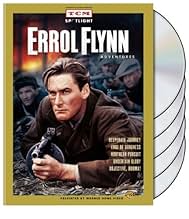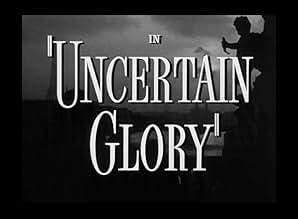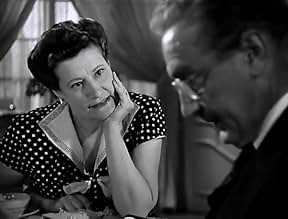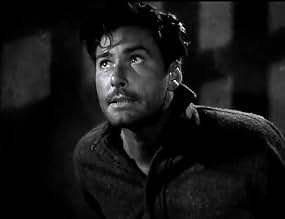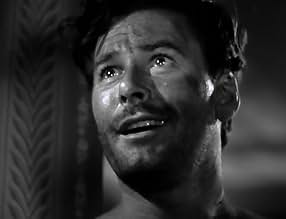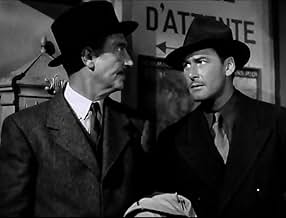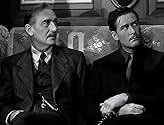VALUTAZIONE IMDb
7,1/10
1550
LA TUA VALUTAZIONE
Aggiungi una trama nella tua linguaAfter a career criminal is recaptured and knows he faces the guillotine, he offers to exchange his life for 100 hostages slated for execution by the Germans.After a career criminal is recaptured and knows he faces the guillotine, he offers to exchange his life for 100 hostages slated for execution by the Germans.After a career criminal is recaptured and knows he faces the guillotine, he offers to exchange his life for 100 hostages slated for execution by the Germans.
Douglass Dumbrille
- Police Commissioner LaFarge
- (as Douglas Dumbrille)
Felix Basch
- Gestapo Major
- (non citato nei titoli originali)
Frederic Brunn
- German Soldier Reporting to Major
- (non citato nei titoli originali)
Nora Bush
- Townswoman
- (non citato nei titoli originali)
James Carlisle
- Townsman
- (non citato nei titoli originali)
Wallis Clark
- Razeau
- (non citato nei titoli originali)
Pedro de Cordoba
- Executioner
- (non citato nei titoli originali)
Fred Cordova
- Execution Guard
- (non citato nei titoli originali)
Recensioni in evidenza
Errol Flynn is headed for "Uncertain Glory" in this 1944 film also starring Paul Lukas, Faye Emerson, Lucille Watson, Sheldon Leonard, and Jean Sullivan. The premise is similar to 1943's "Hangmen Also Die!" in one way - the Nazis have taken hostages who will die unless a saboteur is found. In this case, it's the saboteur who blew up a French bridge and killed Germans. Nazis have taken many men as hostages from a small nearby village. Parallel to this, an Inspector Bonet (Lukas) has finally tracked down a fugitive convicted of murder, Jean Picard (Flynn) who has slipped through France's fingers time and time again - the last time, just as he was about to get the guillotine, the site was bombed, and he escaped. A friend (Leonard) puts Bonet on his trail, and he's eventually caught. En route to another bout with the guillotine, Picard suggests that he'd rather die by firing squad - can't the Inspector say he is the saboteur, save the 100 men, and Picard can still meet his death? After some thought, Bonet agrees. Giving out a report of Picard's death, the name Dupont is given to Picard, someone on whom the Nazis cannot check. The real saboteur, whom they help escape, gives them the critical details - one especially important one - to tell the Nazis.
Raoul Walsh directed this film, which is sluggish at times and obviously just cranked out by Warners - probably one of those ones where Jack Warner whined to Walsh, you have to direct this movie for me. Walsh: Who's in it? Warner: Oh, I don't know. Just do it. According to Walsh, this type of thing went on all the time. It's actually a good story that with a little more in the way of production values could have been excellent.
Paul Lukas is wonderful as a gruff, honest inspector whose patriotism overcomes his honesty and who has bonded with this criminal in spite of himself even though he doesn't trust him and doesn't like him. Flynn does very well in his part - despite Jean's earnest sincerity, you know he wants nothing more than to get away from Bonet as soon as possible, and this whole thing is an elaborate ploy. But he has Bonet half-believing him. Lucille Watson plays a tough woman whose son is one of the hostages and who goes against the village priest to frame someone as the saboteur so her son can be freed.
One of the comments on this site complained about the French people speaking English. I repeat the theatrical rule: when citizens of a country are depicted in their country in a film or play, they would be speaking their own language, not English with a French accent. Therefore, no accent is necessary, Lucille Watson in this movie being the purest example of this. Flynn and Lucas have accents, of course - one just has to pretend they came from different parts of France.
All in all, the two stars make the film worthwhile.
Raoul Walsh directed this film, which is sluggish at times and obviously just cranked out by Warners - probably one of those ones where Jack Warner whined to Walsh, you have to direct this movie for me. Walsh: Who's in it? Warner: Oh, I don't know. Just do it. According to Walsh, this type of thing went on all the time. It's actually a good story that with a little more in the way of production values could have been excellent.
Paul Lukas is wonderful as a gruff, honest inspector whose patriotism overcomes his honesty and who has bonded with this criminal in spite of himself even though he doesn't trust him and doesn't like him. Flynn does very well in his part - despite Jean's earnest sincerity, you know he wants nothing more than to get away from Bonet as soon as possible, and this whole thing is an elaborate ploy. But he has Bonet half-believing him. Lucille Watson plays a tough woman whose son is one of the hostages and who goes against the village priest to frame someone as the saboteur so her son can be freed.
One of the comments on this site complained about the French people speaking English. I repeat the theatrical rule: when citizens of a country are depicted in their country in a film or play, they would be speaking their own language, not English with a French accent. Therefore, no accent is necessary, Lucille Watson in this movie being the purest example of this. Flynn and Lucas have accents, of course - one just has to pretend they came from different parts of France.
All in all, the two stars make the film worthwhile.
Despite being quite a fan of Errol Flynn's, I had somehow managed to go forty years without seeing this movie, largely on the basis of its poor critical reputation. I always loved Flynn's swashbuckling, his insouciance, and especially his poignant performances near the end of his career in "The Sun Also Rises," "The Roots of Heaven," and "Too Much, Too Soon." I expected nothing from "Uncertain Glory," but a clip in a recent Flynn documentary caught my eye with what seemed to be a quite real and touching performance. I finally saw the film tonight and was impressed far beyond expectations. Flynn always harbored a hope of being respected as a dramatic actor, and though I think he achieved that in the previously mentioned later films, I was surprised to find in this 1944 performance a richness and texture every bit the equal of his best dramatic work. The film itself has, like most American movies of its period, certain conventions and unrealities which must be accepted (such as the variance in accents and some melodramatic plot devices), but it seemed to me to be quite believable and realistic within those confines. I was impressed by Paul Lukas, never a favorite of mine in particular, and the story kept me quite involved. Elements of it were quite moving. But Flynn quite simply overwhelmed my every expectation, and I suggest that this film might actually be reconsidered and included among the best pictures of his career. It's certainly one of his best performances.
I am like the poster who managed to go 40 years without seeing this movie. I can say that I liked it very much.
Yes it was a war time movie with all the baggage that entails, but the acting and story were good especially for this genre. It had tension and that tension never really let up for long. The turns and twists of the story were well grounded and the actions made sense within the context of some theatrical license. As with most movie buffs, your mind is ahead of the movie. But in this one I was never really sure which way the story would turn until the end. To me, that is a job well done.
I suppose if it were made today, Flynn would have been just as likely to not have done the noble thing. In the interests of a just society, I am glad he did. I too thought it was one of his best performances.
Yes it was a war time movie with all the baggage that entails, but the acting and story were good especially for this genre. It had tension and that tension never really let up for long. The turns and twists of the story were well grounded and the actions made sense within the context of some theatrical license. As with most movie buffs, your mind is ahead of the movie. But in this one I was never really sure which way the story would turn until the end. To me, that is a job well done.
I suppose if it were made today, Flynn would have been just as likely to not have done the noble thing. In the interests of a just society, I am glad he did. I too thought it was one of his best performances.
It was not until Marcel Ophul's 'Le Chagrin et la Pitié' that the myth of unified French resistance during the Nazi occupation was well and truly shattered. In this film from twenty-six years earlier France is likened to a nag who is 'too old to beef and too tough to die.'
This is a formulaic Warner Bros treatment but what a formula! Fluid editing and atmospheric cinematography from Warner stalwarts George Amy and Sidney Hickox with a dramatic score by Adolph Deutsch.
Warners had taken a chance on the unknown Errol Flynn as Captain Blood in 1935 and in Jack Warner's words: "we knew that we had grasped the brass ring in our thousand to-one shot spin." This is the fifth of seven films starring Flynn and directed by Raoul Walsh and as Flynn is the uncredited executive producer for his own short-lived Thomson Company one assumes he had a say in the casting.
Paul Lukas seems the obvious choice following his stunning performance in 'Watch on the Rhine' and it is the dynamic between his Inspector Bonet and Flynn's criminal Picard/Lafont that makes the film work. There is the customary mish mash of accents of course and Hollywood's inevitable 'God' element is here represented by the charismatic priest of Dennis Hoey. The formidable Lucille Watson never disappoints and there is a lovely performance by the enchanting newcomer Jean Sullivan who soon gave it up to concentrate on her first love, dance.
Throughout its forty-year existence Warners had some trash but it was seldom boring or pretentious and this entertaining film, although certainly not a 'classic', is no exception.
This is a formulaic Warner Bros treatment but what a formula! Fluid editing and atmospheric cinematography from Warner stalwarts George Amy and Sidney Hickox with a dramatic score by Adolph Deutsch.
Warners had taken a chance on the unknown Errol Flynn as Captain Blood in 1935 and in Jack Warner's words: "we knew that we had grasped the brass ring in our thousand to-one shot spin." This is the fifth of seven films starring Flynn and directed by Raoul Walsh and as Flynn is the uncredited executive producer for his own short-lived Thomson Company one assumes he had a say in the casting.
Paul Lukas seems the obvious choice following his stunning performance in 'Watch on the Rhine' and it is the dynamic between his Inspector Bonet and Flynn's criminal Picard/Lafont that makes the film work. There is the customary mish mash of accents of course and Hollywood's inevitable 'God' element is here represented by the charismatic priest of Dennis Hoey. The formidable Lucille Watson never disappoints and there is a lovely performance by the enchanting newcomer Jean Sullivan who soon gave it up to concentrate on her first love, dance.
Throughout its forty-year existence Warners had some trash but it was seldom boring or pretentious and this entertaining film, although certainly not a 'classic', is no exception.
The story takes place in Poitou in the Gartempe Valley.A really nice valley ,but which does not look like the one depicted in the film.THe river is actually hemmed in by steep banks .And how strange to hear people from la Vienne department -who have a marked accent - speak English! Geographically and historically ,this is a deeply inaccurate movie.Without any paper ,Picard can travel without any problem from the small village near Poitiers to Paris .Made in 1944,it was ,like so many others ,a propaganda movie ("La Marseillaise" can be heard at the end of Walsh's work.) Forget the background and you have an absorbing movie,the subject of which is still relevant today.Flynn portrays Picard a sentenced-to-death man,who,on his way to the guillotine ,is saved by the gong (He will say later: "the only help I got from the sky was bombs").But a Javertesque cop (Lukas) is hot on his heels and he arrests him again.
A saboteur blew up a bridge over La Gartempe .The reprisals are terrible:if the "criminal" does not surrender by Tuesday ,one hundred French hostages will be shot.Picard suggests a deal to the cop "I 'd rather be shot than put my head in the guillotine ;so let's make a deal: I 'll tell the Gestapo I'm the saboteur and a hundred lives will be spared.But give me three days just to live..." These three days will be full of unexpected twists,of treason,of nasty tricks (the inhabitants of the village trying to find a scapegoat:"you are inspired by the devil" says the priest;the old lady suggesting an old man he give him up cause he 's got no family) ,of moments of happiness (Picard finds love with the gorgeous Louise -a brunette,Lucile Watson ,who I first mistook for Jennifer Jones-) ,but also of doubt and fear.Interest is sustained till the very last pictures.Flynn gives a mature performance ,far from his dashing usual heroes.Excellent supporting cast.
"Uncertain Glory" might have influenced Henri Jeanson and Christian-Jaque when they made their underrated " Le Repas des Fauves" (1964).
A saboteur blew up a bridge over La Gartempe .The reprisals are terrible:if the "criminal" does not surrender by Tuesday ,one hundred French hostages will be shot.Picard suggests a deal to the cop "I 'd rather be shot than put my head in the guillotine ;so let's make a deal: I 'll tell the Gestapo I'm the saboteur and a hundred lives will be spared.But give me three days just to live..." These three days will be full of unexpected twists,of treason,of nasty tricks (the inhabitants of the village trying to find a scapegoat:"you are inspired by the devil" says the priest;the old lady suggesting an old man he give him up cause he 's got no family) ,of moments of happiness (Picard finds love with the gorgeous Louise -a brunette,Lucile Watson ,who I first mistook for Jennifer Jones-) ,but also of doubt and fear.Interest is sustained till the very last pictures.Flynn gives a mature performance ,far from his dashing usual heroes.Excellent supporting cast.
"Uncertain Glory" might have influenced Henri Jeanson and Christian-Jaque when they made their underrated " Le Repas des Fauves" (1964).
Lo sapevi?
- QuizErrol Flynn was criticized for playing heroes in World War II movies. Tony Thomas in his book 'Errol Flynn: The Spy Who Never Was' states that Flynn had tried to enlist in every branch of any armed services he could but was rejected as unfit for service on the grounds of his health. He had a heart condition, tuberculosis, malaria and a back problem. Flynn felt he could contribute to America's war effort by appearing in such films as La bandiera sventola ancora (1943); L'ostaggio (1943); Bombardieri in picchiata (1941), Obiettivo Burma! (1945) and Tre giorni di gloria (1944). Reportedly, Flynn was at his most professional and co-operative he ever was whilst working on Second World War movies. The studios apparently did not diffuse the criticism of Flynn's state-of-health as they wished to keep it quiet for fear of his box-office draw waning.
- BlooperAbout 1:20 into the film, there is a scene where the French police are coming into the town at night. One, on a motorcycle, rounding a corner, seemingly slips on the wet cobblestones and crashes in front of the camera - the shadow of his head flashes across the bottom of the screen and the sound of his presumed crash can be heard.
- Citazioni
Jean Picard: [indignantly to the barber just before he is to be sent to face the guillotine] My head comes off as it is!
- ConnessioniFeatured in The Adventures of Errol Flynn (2005)
- Colonne sonoreLa Marseillaise
(1792) (uncredited)
Music by Claude Joseph Rouget de Lisle
Variations in the score often
I più visti
Accedi per valutare e creare un elenco di titoli salvati per ottenere consigli personalizzati
- How long is Uncertain Glory?Powered by Alexa
Dettagli
- Tempo di esecuzione1 ora 42 minuti
- Colore
- Proporzioni
- 1.37 : 1
Contribuisci a questa pagina
Suggerisci una modifica o aggiungi i contenuti mancanti



